Everyone has studied that vitamins and minerals are vital for our health, but do you remember well why they are so valuable for us?
Consuming healthy foods such as fruits and vegetables is the best way to get vitamins and minerals.
Sometimes we forget why these nutrients are so important for our health and what makes them so valuable.
Find out more about vitamins and their important role in maintaining good health.
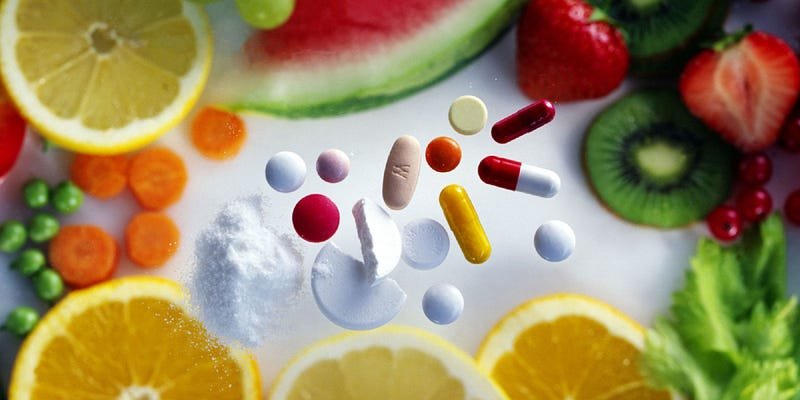
What are the Vitamins and Minerals?
Vitamins and minerals are essential nutrients for our health.
They convert food into energy and help heal wounds. These nutrients also boost our immune systems and repair cellular damage.
Both groups — the vitamins and minerals are vital for us, but let’s see why.
What are Vitamins?
Vitamins are known as “organic” since they always contain carbon.
They are a group of nutrients required for normal cell function, development, and growth.
There are 13 vitamins our body needs, and they are either water-soluble or fat-soluble :
- Vitamin A
- Vitamin C (L-ascorbic acid, Ascorbic acid)
- Vitamin D (Calciferol)
- Vitamin E
- Vitamin K
- Vitamin B1 (Thiamine)
- Vitamin B2 (Riboflavin)
- Vitamin B3 (Niacin)
- Vitamin B5 (Pantothenic acid)
- Vitamin B6 (Pyridoxine)
- Vitamin B7 (Biotin)
- Vitamin B9 (Folate, Folic acid, Folacin)
- Vitamin B12 (Cobalamin, Cyanocobalamin)
The eight Vitamins with the letter B form a group known as B-complex.
If you are curious why some of the B — vitamins are missing,then this article is for you: What Happened to Vitamins B4, B8, B10, and B11?
B-complex vitamins and vitamin C are water-soluble. These vitamins are not stored in the body and must be replaced every day.
The fat-soluble vitamins are easier for the body to store than water-soluble. The four fat-soluble vitamins are vitamins A, D, E, and K.
The Vitamins that Our body Needs
VITAMIN A

What is Vitamin A?
Vitamin A exists in two forms in foods: Carotenoids (which include beta-carotene) and Retinoids (which include retinol). Carotenoids are also known as Provitamin A carotenoids. Retinoids are popular as Preformed vitamin A.
Carotenoids vs. Retinoids
Carotenoids have greater amounts of vitamin A, and they also act as antioxidants. Beta-carotene is what gives some fruits and orange vegetables their hue.
The body converts these plant pigments into vitamin A. Beta-carotene can easily be converted to vitamin A as needed.
Retinoids are well known for being the best does-it-all skin solution. The popular Retinol is in foods from animal sources such as eggs and dairy products, fish, and meat (especially liver or kidneys).
What does Vitamin A do, and What are the benefits of it?
Vitamin A is essential for our good vision, cell and bone growth, and a healthy immune system. Vitamin A keeps tissues and skin healthy and plays a role in our reproduction.
Sources of Vitamin A
Carotenoids can be found in plants such as carrots, dark and yellow vegetables, and fruits. Spinach and some other dark-green, leafy veggies also have a lot. Retinoids can be found in Eggs, Shrimp, Fish, Butter, Fortified milk, Cheddar cheese, Swiss cheese, Beef Liver.
Foods that are particularly high in Vitamin A
Among the foods that are particularly high in Vitamin A are: Beef Liver, Lamb Liver, Liver products, Cod Liver Oil, King Mackerel, Salmon, Bluefin Tuna, Goose Liver Pâté, Goat Cheese, Butter, Limburger Cheese, Cheddar, Camembert, Roquefort Cheese, Hard-Boiled Egg, Trout, Blue Cheese, Cream Cheese, Caviar, Feta Cheese.
Fruits and Vegetables that are particularly high in Vitamin A
Among the Fruits and Vegetables that are particularly high in Vitamin A are: Carrots, Sweet potatoes, Winter squash, Cantaloupe, Apricots, Spinach, Kale, Collard greens.
Spices that are particularly high in Vitamin A
Among the Spices that are particularly high in Vitamin A are: Paprika, Red pepper, Cayenne, and Chili powder.
VITAMIN B1

What does Vitamin B1 do, and What are the benefits of it?
Thiamin or Vitamin B1 promotes normal appetite, releases energy from foods, and is important in maintaining a healthy nervous system function.
Vitamin B1 is needed for healthy muscles, skin, hair, and brain. Thiamine was named B1 because it was the first B-complex vitamin to be discovered.
Same as all other vitamins of the B complex, Vitamin B1 is water-soluble.
Sources of Vitamin B1
Vitamin B1 can be found in Whole grains, Fat-free or Low-fat milk and Milk products, Oils, and Beans.
Thiamin’s good sources are a variety of Fruits, Vegetables, Protein Foods, Poultry, Eggs, Legumes (Beans And Peas), Lean Meats, Nuts, Seeds, And Soy Products. Pork, Fish, Beef, And Seafood.
Foods that are particularly high in Vitamin B1
Most nutritious foods contain some thiamin. Among the foods that are particularly high in Vitamin B1 are Pork Chops, Ham, Soymilk, Beef, Liver, Dried milk, Nuts, Oats, Pork, Eggs, Seeds, Legumes, Sunflower Seeds, Flax Seeds, Sesame Seeds, Peanuts, Tofu, Tuna, Brewers Yeast.
Fruits and Vegetables that are particularly high in Vitamin B1
Among the Fruits and Vegetables that are particularly high in Vitamin B1 are Navy Beans, Black Beans, Barley, Dried Peas, Lentils, Pinto Beans, Lima Beans, Kidney Beans.
Spices that are particularly high in Vitamin B1
Among the Spices that are particularly high in Vitamin B1 are Cumin, Parsley, Coriander, Coriander, Poppy Seed, Mustard Yellow, Sage, Paprika, Rosemary, Thyme, Onion Powder, Garlic Powder, Dill, Fennel, Caraway, Chervil, Savory, Chili Powder, Nutmeg Ground, Celery, Anise, Red Pepper, Cayenne Pepper, Fenugreek, Mace, Marjoram, Spearmint, Curry Powder, Tarragon.
VITAMIN B2
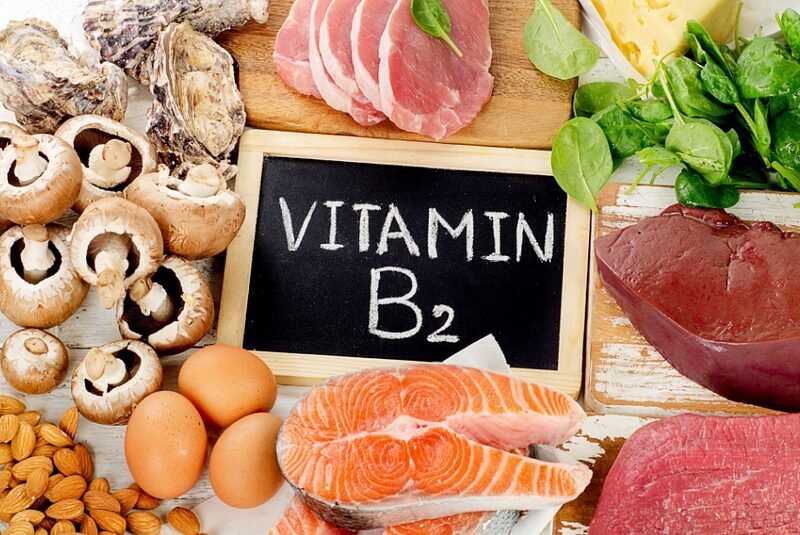
What does Vitamin B2 do, and What are the benefits of it?
Vitamin B2 (Riboflavin) helps us to convert food into energy. Riboflavin is needed for healthy hair, skin, blood, and brain.
Sources of Vitamin B2
Vitamin B2 (Riboflavin) can be found in Milk, Eggs, Yogurt, Cheese, Meats, Green leafy vegetables, Whole and Enriched grains, and Cereals.
Foods that are particularly high in Vitamin B2
Among the foods that are particularly high in Vitamin B2 (Riboflavin) are Beef, Tofu, Milk, Fish, Pork, Spinach, Almonds, Eggs, Tempeh, Almonds, Turkey.
Fruits and Vegetables that are particularly high in Vitamin B2
Among the Fruits and Vegetables that are particularly high in Vitamin B2 are Cremini Mushrooms, Asparagus, Sea Vegetables, Collards, Beet Greens, Avocados, Collard Greens, Broccoli, Green Beans, Shiitake Mushrooms, Bok Choy, Turnip Greens, Kale, Mustard Greens, Bell Peppers, Soybeans, Green Peas, Sweet Potato, Winter Squash, Brussels Sprouts, Grapes, Cabbage, Carrots, Summer Squash, Romaine Lettuce, Cauliflower, Celery, Chili Peppers.
Spices that are particularly high in Vitamin B2
Among the Spices that are particularly high in Vitamin B2 (Riboflavin) are Yeast, Miso, Parsley, Paprika, Red pepper, Basil, Chili powder, Thyme, Sage, Japanese pepper, Clove, Wasabi, Mustard, Curry powder, Black Pepper, Ginger, Garlic, Cinnamon, White Pepper, Nutmeg, Onion powder, Fruit vinegar, Rice vinegar, Grain vinegar.
VITAMIN B3
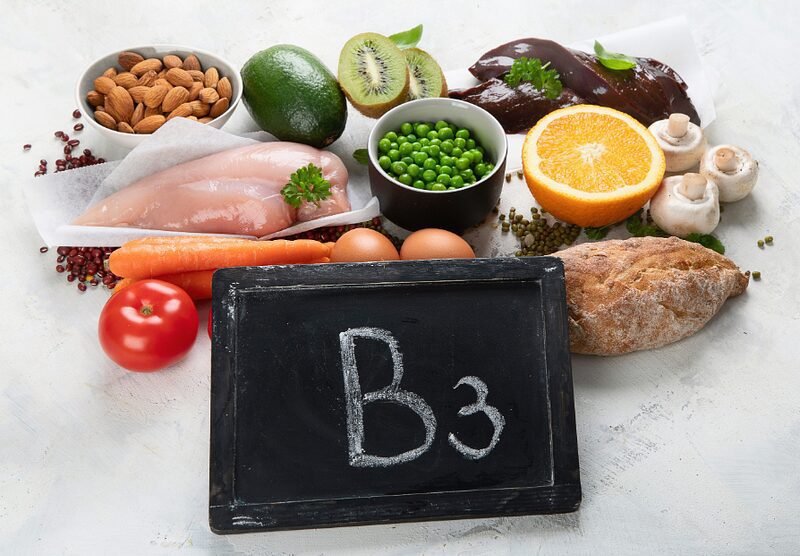
What does Vitamin B3 do? And What are the benefits of it?
Helps convert food into energy. Important for healthy skin, brain, blood cells, and the nervous system. Vitamin B3 (nicotinic acid or niacin) occurs naturally in food. Niacin can also be made by our body from the amino acid tryptophan, with the help of B6.
Sources of Vitamin B3
Sources of Vitamin B3 are Meat, Poultry, Fish, Fortified Grains, Whole Grains, Mushrooms, Potatoes, Peanut Butter.
Foods that are particularly high in Vitamin B3
Among the foods that are particularly high in Vitamin B3 (Nicotinic acid, Niacin) are Chicken, Liver, Tuna, Turkey, Salmon, Lamb, Anchovies, Pork, Beef, Sardines, Peanuts, Sunflower Seeds, Shrimp, Brown Rice, Whole Wheat, Whole Grains, Fortified and Enriched Foods.
Fruits and Vegetables that are particularly high in Vitamin B3
Among the Fruits and Vegetables that are particularly high in Vitamin B3 (Nicotinic acid, Niacin) are Spirulina (blue-green algae), Avocado, Mushrooms, Green Peas, Potatoes, Sweet Potatoes, Asparagus, Butternut Squash, Okra, Corn, Peas, Parsnip, Winter Squash, Pumpkins, Green Leafy Vegetables, Coffee, Tea.
Spices that are particularly high in Vitamin B3
Among the Spices that are particularly high in Vitamin B3 (Niacin, Nicotinic acid) are Sisymbrium, Paprika, Sesame, Ginkgo nuts, Coriander, Tarragon, Red Pepper, Cayenne Pepper, Sunflower Seeds, Parsley, Chili Powder, Breadfruit, Basil, Sesame, Spearmint, Fennel Seed, Sage, Chervil, Turmeric, Thyme, Mustard Seed, Oregano, Cumin Seed, Cottonseed, Marjoram, Savory, Caraway Seed, Flaxseeds (Linseeds), Celery Seed, Dill, Allspice, Safflower Seed, Anise Seeds, Bay Leaf, Peppermint, Fresh Fenugreek Seed.
VITAMIN B5
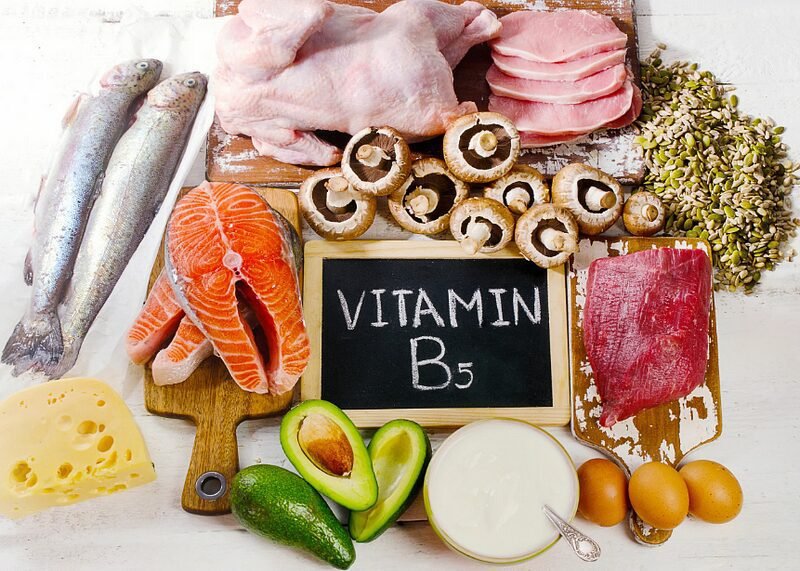
What does Vitamin B5 do? And What are the benefits of it?
Vitamin B5, also known as Pantothenic acid, serves several bodily functions, such as converting food to energy and synthesizing cholesterol. This vitamin also helps our body build neurotransmitters, form sex and stress-related hormones, red blood cells, and hemoglobin.
Sources of Vitamin B5
Sources of Vitamin B5 are a wide variety of nutritious foods, including Egg yolk, Chicken, Fish, Lobster, Shellfish, Pork, Turkey, Duck, Beef, Cheese, Animal organs such as Liver and Kidneys, Whole grains, Cereals, Legumes, Seeds, Vegetables, Tomato products, Chestnuts, Milk, Yogurt, and Milk products. See more sources of Vitamin B5.
Foods that are particularly high in Vitamin B5
Among the foods that are particularly high in Vitamin B5 (Pantothenic acid) are Chicken liver, Duck liver, Beef liver, Shiitake Mushrooms, Salmon, Avocados, Lean Chicken Breast, Beef, Sunflower Seeds, Lean Pork Chops, Goose, Peanuts, Oats, Yeast (baker’s yeast).
See more foods rich in Pantothenic acid (B5)
Fruits and Vegetables that are particularly high in Vitamin B5
Among the Fruits and Vegetables that are particularly high in Vitamin B5 are: Mushrooms, Avocado, Broccoli, Sweet Potatoes, Corn, Cauliflower, Kale, Lentils, Corn, Tomatoes, Brown rice, Chickpeas, Guava.
Spices that are particularly high in Vitamin B5
Among the Spices that are particularly high in Vitamin B5 (Pantothenic acid) are Dill, Basil, Paprika, Rosemary, Spearmint, Peppermint, Mustard, Thyme, Garlic, Ginger, Mustard.
VITAMIN B6
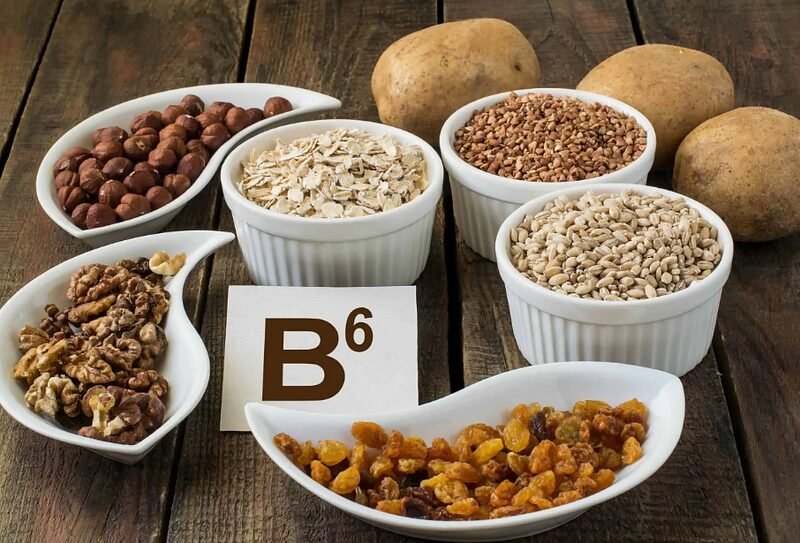
What does Vitamin B6 do, And What are the benefits of it?
Vitamin B6, also known as pyridoxine, plays a key role in sleep, appetite, and moods. This vitamin aids in lowering homocysteine levels and could reduce the risk of heart disease. Vitamin B6 helps our body to produce red blood cells and influences the immune function and cognitive abilities.
Sources of Vitamin B6
Among Vitamin B6 are Meat, Fish, Poultry, Legumes, Tofu, and other Soy products, Potatoes, Blackstrap Molasses, Sesame Seeds, Sunflower Seeds, Raisins, Noncitrus fruits such as Watermelons and Bananas.
Foods that are particularly high in Vitamin B6
Among the foods that are particularly high in Vitamin B6 are Milk, Ricotta cheese, Salmon, Tuna, Eggs, Chicken liver, Beef, Chicken, Tofu, Pork, Cereals, Pistachios, White Rice.
Fruits and Vegetables that are particularly high in Vitamin B6
Among the Fruits and Vegetables that are particularly high in Vitamin B6 are: Carrots, Spinach, Potatoes, Sweet potatoes, Green peas, Bananas, Chickpeas, Avocado, Pinto Beans, Watermelons, Onions, Spinach.
Spices that are particularly high in Vitamin B6
Among the Spices that are particularly high in Vitamin B6 are Paprika, Chili Powder, Basil, Mint, Garlic Powder, Sage, Tarragon, Red Pepper, Cayenne, Dill, Basil, Savory, Bay Leaf, Rosemary, Turmeric, Marjoram, Oregano, Chervil, Parsley, Curry Powder, Onion Powder, Thyme.
VITAMIN B7
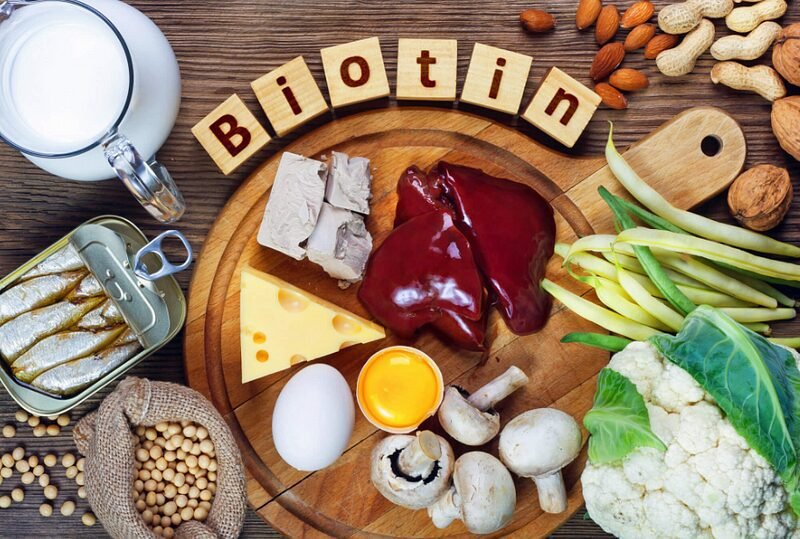
What does Vitamin B7 do, and What are the benefits of it?
Vitamin B7, known as Biotin, has essential metabolic functions.
Without it, many enzymes do not work properly, and complications can occur, including varied diseases of the intestinal tract, skin, and the nervous system. Vitamin B7 is needed for healthy hair and bones and is formerly known as coenzyme R or vitamin H.
This essential vitamin aids the body to convert food into energy and synthesize glucose. Biotin also helps make and break down some fatty acids.
Sources of Vitamin B7
Among Vitamin B7 (Biotin) sources are many foods, including Whole grains, Liver and other organ meats, Egg yolks, Soybeans, Fish, Nuts, Seeds, Milk, and Dairy products.
Foods that are particularly high in Vitamin B7
Among the foods that are particularly high in Vitamin B7 (Biotin) are Organ Meats, Brewer’s Yeast, Nutritional Yeast, Oats, Barley, Almonds, Fortified Cereals, Barley, Corn, Egg Yolks, Soy, Royal Jelly, Wheat Bran, Bread, Milk, Cheeses (Cheddar cheese), Chicken, Salmon, Legumes, Nuts, Pork, Pecans, Walnuts, Peanuts, Rice.
Fruits and Vegetables that are particularly high in Vitamin B7
Among the Fruits and Vegetables that are particularly high in Vitamin B7 (Biotin) are Green peas, Lentils, Avocado, Broccoli, Cauliflower, Mushrooms, Sweet Potato, Potatoes, Spinach, Bananas, Raspberries, Onions, Tomatoes, Carrots, Lettuce, Beetroot.
Spices that are particularly high in Vitamin B7
Among the Spices that are particularly high in Vitamin B7 are: Mustard, Basil, Red pepper, Paprika, Curry powder, Japanese pepper, Wasabi, Parsley, Black Pepper, Miso, Ginger, Garlic, Cinnamon.
VITAMIN B9
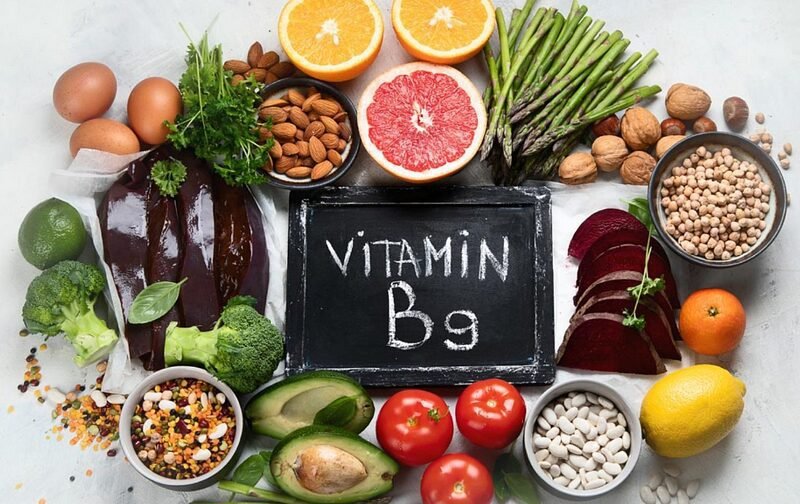
What does Vitamin B9 do, and What are the benefits of it?
Vitamin B9, also known as Folic acid (Folate, Folacin), works with Vitamin B12 to help form red blood cells. Folate is important since it is needed to produce DNA, which controls cell function and tissue growth.
This vitamin helps prevent spine and brain congenital disabilities if taken early in pregnancy.
Vitamin B9 (Folic acid) may reduce heart disease risk and the risk of colon cancer.
Offsets breast cancer risk among women who consume alcohol. Many foods are nowadays fortified with Vitamin B9.
Sources of Vitamin B9
Among the sources of Vitamin B9 (Folic acid) are Fortified Grains, Fortified Cereals, Asparagus, Okra, Leafy Greens, Beets, Beans, Lentils, Brussels sprouts, Turnip greens, Broccoli, Citrus Fruits, Orange juice, Tomato juice, Celery, Carrots.
Foods that are particularly high in Vitamin B9
Among the foods that are particularly high in Vitamin B9 are Turkey Liver, Chicken Liver, Lamb Liver, Beef liver, Yeast extract spread, Wheat Germ, Pasta, Legumes, Corn, Sunflower seeds, Flax seeds, Peanuts, Almonds, Eggs, Soybean Sprouts.
Fruits and Vegetables that are particularly high in Vitamin B9
Among the Fruits and Vegetables that are particularly high in Vitamin B9 are Arrowroot, Edamame, Lentils, Mango, Lettuce, Sweet Corn, Spinach, Asparagus, Okra, Spinach, Turnip greens, Brussels sprouts, Broccoli, Papaya, Black-eyed peas, Beets, Chickpeas, Banana, Kale, Arugula, Orange, Grapefruit, Lime, Lemon, Squash, Avocado, Celery, Carrots, Green Beans, Escarole, Endive.
Spices that are particularly high in Vitamin B9
Among the Spices that are particularly high in Vitamin B9 are Spearmint, Rosemary, Basil, Chervil, Coriander, Marjoram, Oregano, Sage, Tarragon, Thyme, Bay Leaf, Parsley, Onion Powder, Curry Powder, Dill Weed, Peppermint, Rosemary, Paprika, Red Pepper, Cayenne, Chili Powder, Cloves, Saffron, Poppy Seed.
VITAMIN B12
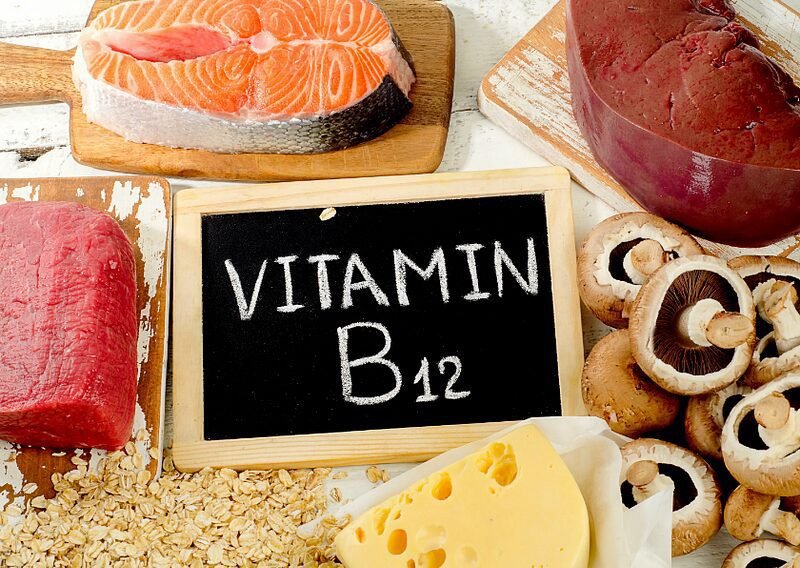
What does Vitamin B12 do, and What are the benefits of it?
Vitamin B12 (also known as Cobalamin, Cyanocobalamin) aids in making new cells and breaking down some fatty and amino acids. Besides helps the human body to make red blood cells and DNA.
Vitamin B12 assists in lowering homocysteine levels and may lower the risk of heart disease. Cobalamin (Vitamin B12) protects nerve cells and encourages their normal growth.
Sources of Vitamin B12
It is interesting to know that there are no plant-derived foods that can provide sustainable Cobalamin (Vitamin B12). Among the sources of Vitamin B12 are Clams, Beef Liver, Meat, Poultry, Milk, Cheese, Eggs, Fish, Fortified Cereals, Fortified Soymilk.
Foods that are particularly high in Vitamin B12
Among the foods that are particularly high in Vitamin B12 are Mollusks, Clams, Oysters, Crab, Animal Liver and Kidneys, Clams, Sardines, Beef, Fortified Cereal, Tuna, Mackerel, Fortified Nutritional Yeast, Lamb, Trout, Salmon, Yogurt, Milk and Dairy Products, Ham, Fortified Non-Dairy Milk, Eggs, Haddock, Chicken.
Fruits and Vegetables that are particularly high in Vitamin B12
Vitamin B12 is naturally found only in animal foods. There are no Fruits and Vegetables that contain a sustainable amount of Vitamin B12. For this reason, vegetarians are considered an at-risk group for vitamin B12 deficiency. Vegetarians can use alternative sources for obtaining Vitamin B12.
Spices that are particularly high in Vitamin B12
Vitamin B12 can be found only in animal foods. There are no Spices that contain a sustainable amount of Cobalamin.
VITAMIN C
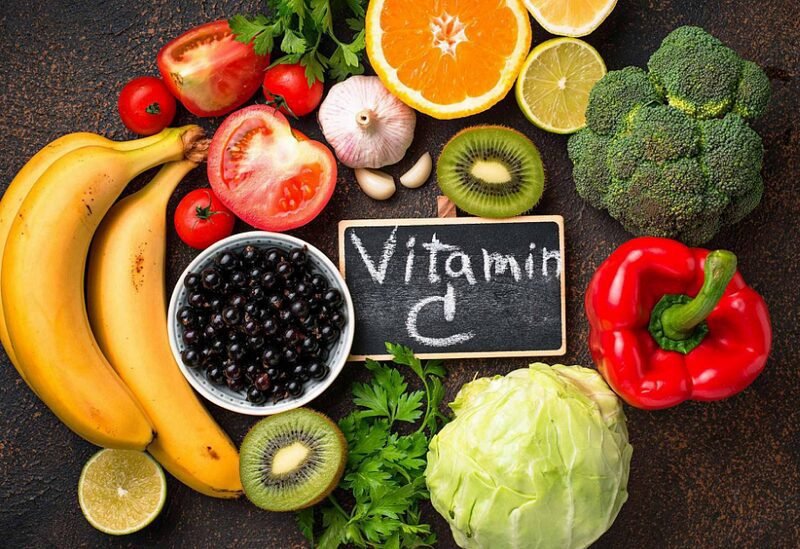
What is Vitamin C?
Vitamin C is also known as Ascorbic acid and L-ascorbic acid, and it was the first vitamin to be chemically produced. The ascorbic acid is an excellent antioxidant and is required for the functioning of several enzymes. Vitamin C is vital for the proper operation of our immune systems.
What does Vitamin C do, and What are the benefits of it?
Vitamin C is a water-soluble vitamin needed for normal growth and development.
It helps the body to produce collagen, a connective tissue that knits together wounds and supports blood vessel walls.
Vitamin C acts as an antioxidant, neutralizing unstable molecules that can damage cells, and boosts the immune system. Apart from the above mentioned, the Ascorbic acid (Vitamin C ) also :
- Promotes bone health;
- It is important for promoting healthy gums and teeth;
- Provides resistance against certain pathogens ;
- It improves the body’s iron absorption;
- Fights infections and helps healing wounds;
Sources of Vitamin C
Among the sources of Vitamin C are: Fruits, Fruit Juices (Especially Citrus), Potatoes, Broccoli, Bell Peppers, Brussels Sprouts, Spinach, Strawberries, Tomatoes.
Foods that are particularly high in Vitamin C
Among the foods that are particularly high in Vitamin C are Kakadu plums, Acerola Cherries, Rose Hips, Chili Peppers, Guavas, Sweet Yellow Peppers, Blackcurrants, Thyme, Parsley, Mustard Spinach, Kale, Kiwifruits, Broccoli, Brussels Sprouts, Lemons, Lychees, Persimmons, Papayas, Strawberries, Oranges, Bell Peppers, Pineapples, Cantaloupe, Cauliflower, Tomatoes, Dark leafy greens, Mustard greens, Chard.
Fruits and Vegetables that are particularly high in Vitamin C
Among the Fruits and Vegetables that are particularly high in Vitamin C are: Mustard Spinach, Kale, Broccoli, Brussels Sprout, Bell Pepper, Sweet Yellow Pepper, Cauliflower, Tomato, Chili Pepper, Mustard greens, Swiss Chard, Dark leafy greens, Kakadu plum, Acerola Cherry, Rose Hips, Guava, Blackcurrant, Lemon, Lychee, Persimmon, Papaya, Strawberry, Orange, Pineapple, Cantaloupe, Kiwi.
Spices that are particularly high in Vitamin C
Among the Spices that are particularly high in Vitamin C are Coriander, Thyme, Parsley, Dill Weed, Cloves, Saffron, Red Pepper, Cayenne Pepper, Paprika, Chili, Basil, Rosemary, Marjoram, Chervil, Dill Weed, Oregano, Savory, Tarragon, Bay Leaf, Sage, Peppermint, Turmeric, Horseradish, Rosemary, Anise Seed, Caraway Seed, Cardamom, Coriander, Dill Seed, Fennel Seed, Mace, Black Pepper, White Pepper, Basil, Celery Seed, Garlic.
VITAMIN D
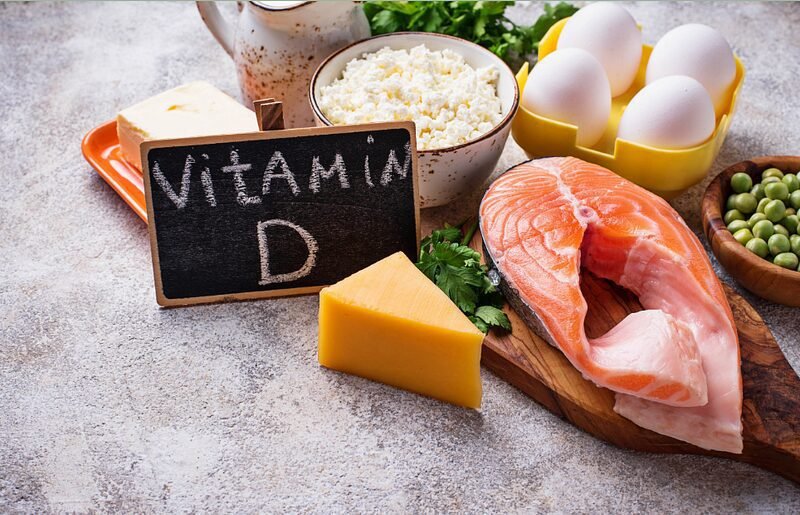
What is Vitamin D?
Vitamin D, also known as Calciferol, helps to form bones and teeth. Calciferol maintains normal blood levels of calcium and phosphorus, which strengthens bones. Vitamin D plays a significant role in metabolism.
What does Vitamin D do, and What are the benefits of it?
Vitamin D actually represents a group of fat-soluble secosteroids. In the human body, the most important compounds in this group of vitamins are the vitamins D2 and D3.
Vitamin D2 and Vitamin D3 can be ingested from the diet and supplements.
Vitamin D is responsible for increasing the absorption of Calcium, Phosphate, Magnesium, and multiple other biological effects. Calciferol can help protect against infections by keeping our immune systems healthy and protecting older adults against osteoporosis. Vitamin D is super beneficial, especially in brain function, bone strength, weight-loss, and skin health.
The major natural source of this vitamin is sun exposure (Ultraviolet B radiation). Only a few foods contain Vitamin D.
Calciferol is fat-soluble, which means our body can absorb it when taken with higher-fat foods. This also means that our bodies can store extra amounts of vitamin D.
Sources of Vitamin D
Among Vitamin D sources, also known as the “sunshine vitamin,” are Fortified milk, Margarine, Fortified cereals, Fatty fish, and Red meat.
Foods that are particularly high in Vitamin D
Among the foods that are particularly high in Vitamin D are Wild Salmon, Sardines, Tuna, Mackerel, Halibut, Trout, Herring, Oysters, Shrimp, Caviar, Canned fish, Cheese, Eggs, Vitamin D fortified milk, Vitamin D fortified cereal, Vitamin D fortified Margarine, Orange juice, Soy milk, Yogurt, Beef liver, Calf liver, Egg yolks, Chanterelle Mushrooms, Shiitake Mushrooms, Maitake mushrooms, Portabella mushrooms, Cremini Mushrooms, Fortified Tofu, Pork Chops, Deli meat, Oats, Butter, Sour cream, Emu oil, Salami, and sausages.
VITAMIN E
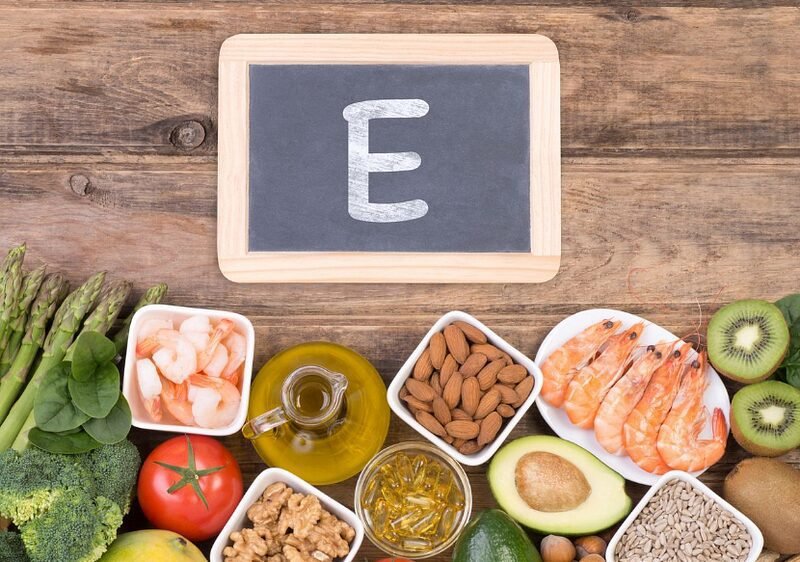
What is Vitamin E?
What does Vitamin E do, and What are the benefits of it?
Vitamin E is an oxidant and nutrient that’s important to vision, reproduction, and the health of your blood, brain, and skin.
This vitamin helps maintain healthy eyes and skin and strengthens the body’s immune system against illness and infections.
Sources of Vitamin E
Among the natural sources of Vitamin E are many foods, including Eggs, Meat, Cereals, Poultry, Fruits, Nuts, Seeds, Vegetables, Vegetable oils, Wheat germ oil. Vitamin E is also available as a supplement.
Foods that are particularly high in Vitamin E
Among the foods that are particularly high in Vitamin E are Wheat germ oil, Sunflower seeds, Almonds, Sunflower oil, Safflower oil, Hazelnuts, Peanut butter, Peanuts, Corn oil, Soybean oil, Abalones, Rainbow Trout, Atlantic Salmon, Brazil Nuts, Fish Roe, Goose Meat, Snails, Crayfish, Octopus, Lobster, Cod, Pine Nuts, Pumpkin Seeds, Pistachios, Pecans, Cashew Nuts.
Fruits and Vegetables that are particularly high in Vitamin E
Among the Fruits and Vegetables that are particularly high in Vitamin E are Spinach, Broccoli, Kiwifruit, Mango, Tomato, Mamey Sapote, Red Sweet Pepper, Avocado, Turnip Greens, Blackberries, Black Currants, Cranberries, Olives, Apricots, Raspberries, Beet Greens, Butternut Squash, Mustard Greens, Asparagus, Swiss Chard, Collards.
Spices that are particularly high in Vitamin E
Among the Spices that are particularly high in Vitamin E are Paprika, Red, Pepper, Cayenne Chili, Curry, Oregano, Ginger, Cloves, Basil, Sage, Thyme, Parsley, Cumin, Turmeric, Mustard, Caraway, Cinnamon, Poppy, Marjoram, Celery, Coriander, Capers, Basil, Black, Pepper, Garlic Powder, Onion, Powder, Horseradish.
VITAMIN K
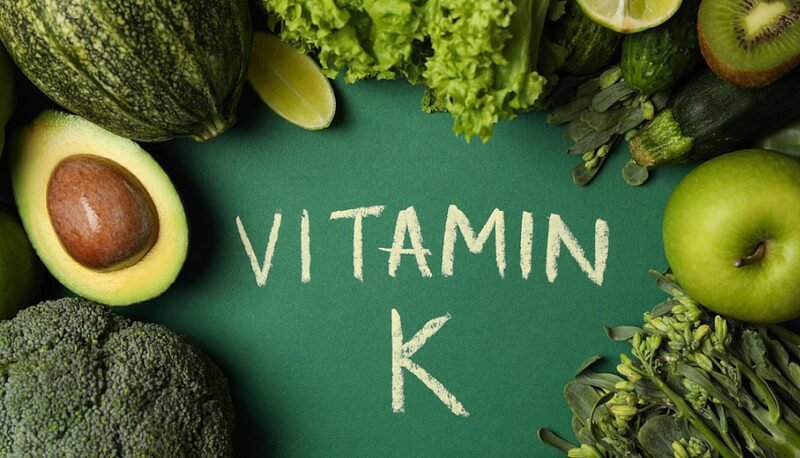
What is Vitamin K?
Vitamin K is a fat-soluble vitamin, and its name “K” is derived from the German word “koagulation” which means coagulation. This vitamin is an important nutrient that has a vital role in blood clotting, heart, and bone health.
What does Vitamin K do, and What are the benefits of it?
Vitamin K activates calcium and proteins essential to blood clotting. This vitamin is essential for bone metabolism, regulating various cellular functions and preventing vessel mineralization. Vitamin K may help prevent hip fractures. Without vitamin K, our bodies cannot produce prothrombin, a clotting factor required for blood clotting and bone metabolism.
Naturally occurring forms of vitamin K include Vitamin K1(phylloquinone) and Vitamin K2 (a family of molecules called menaquinones).
Vitamin K1 is obtained from plants, and it is the main type of dietary vitamin K.
Vitamin K2 is a lesser source and is mainly obtained from animal-based foods such as eggs, meats, cheeses, fermented foods, and synthesized by bacteria. When people eat food containing vitamin K1, bacteria in the large intestine convert it to its storage form, vitamin K2.
Sources of Vitamin K
Among the sources of Vitamin K are Cabbage, Eggs, Milk, Liver, Spinach, Broccoli, Collards, Sprouts, Kale, and other Green Vegetables.
Foods that are particularly high in Vitamin K
Among the foods that are particularly high in Vitamin K are Kale, Mustard Greens, Swiss Chard, Collard Greens, Natto, Spinach, Broccoli, Brussels Sprouts, Beef Liver, Pork Chops, Chicken, Goose Liver Paste, Green Beans, Bacon, Prunes, Kiwi, Soybean Oil, Hard Cheeses, Jarlsberg Cheese, Avocado, Green Peas, Soft Cheeses, Edam Cheese, Blue Cheese, Cashews, Hazelnuts, Ground Beef, Pork Liver, Duck Breast, Beef Kidneys, Egg Yolk, Cheddar, Chicken Liver, Cream, Walnuts, Whole Milk, Butter, Pecans, Pine Nuts.
Fruits and Vegetables that are particularly high in Vitamin K
Among the Fruits and Vegetables that are particularly high in Vitamin K are Kale, Mustard Greens, Swiss Chard, Beet Greens, Parsley, Spinach, Broccoli, Brussels Sprouts, Cabbage, Prunes, Kiwi, Avocado, Blackberries, Blueberries, Pomegranate, Figs, Tomatoes, Grapes, Red Currants, Green Beans, Green Peas, Soybeans, Sprouted Mung Beans, Red Kidney Beans.
Spices that are particularly high in Vitamin K
Among the Spices that are particularly high in Vitamin K are Thyme, Sage, Basil, Parsley, Coriander, Oregano, Marjoram, Black Pepper, Cloves, Chili, Curry Powder, Red Pepper, Cayenne, Paprika, Cinnamon, Turmeric, Mustard Yellow, Cumin, Onion, Ginger, Garlic.

The Bottom Line
Vitamins, together with minerals, are vital nutrients, and they perform hundreds of roles in our bodies.
These essential elements help normal growth and development. They also support organs to function properly.
We get vitamins and minerals by eating sufficient quantities of healthy foods, such as fruits and vegetables, meat, cereals, nuts, and consuming liquids.
Maintaining a healthy food regime remains the best way to get the right balance of the vitamins and minerals we need.